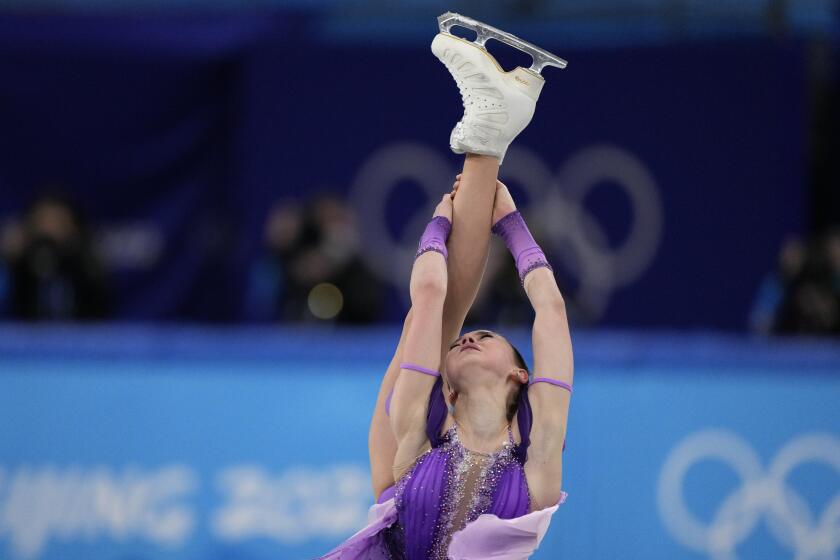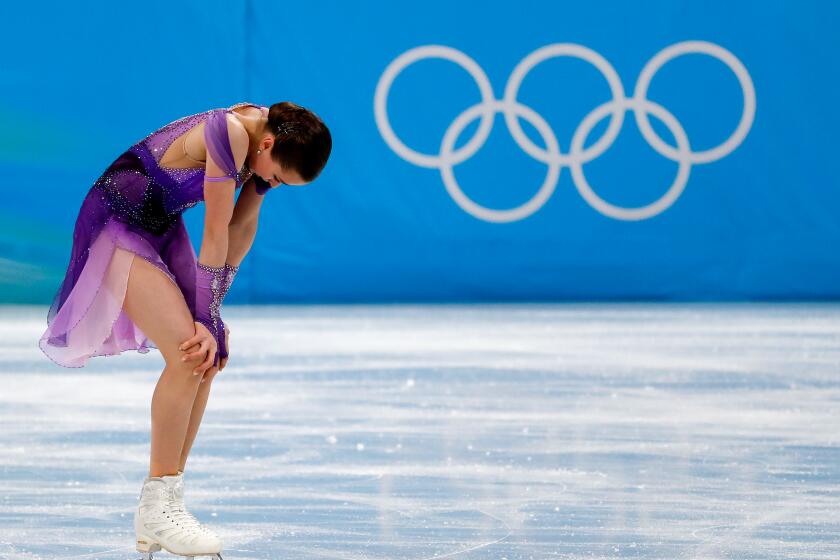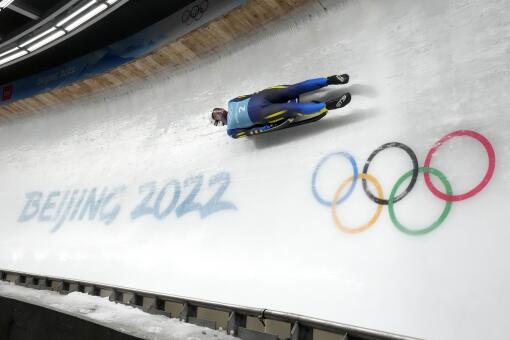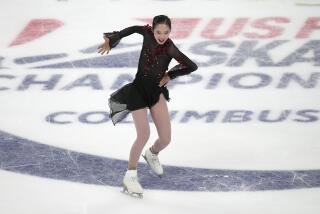Embroiled by doping accusations, ROC’s Kamila Valieva tumbles out of medal contention
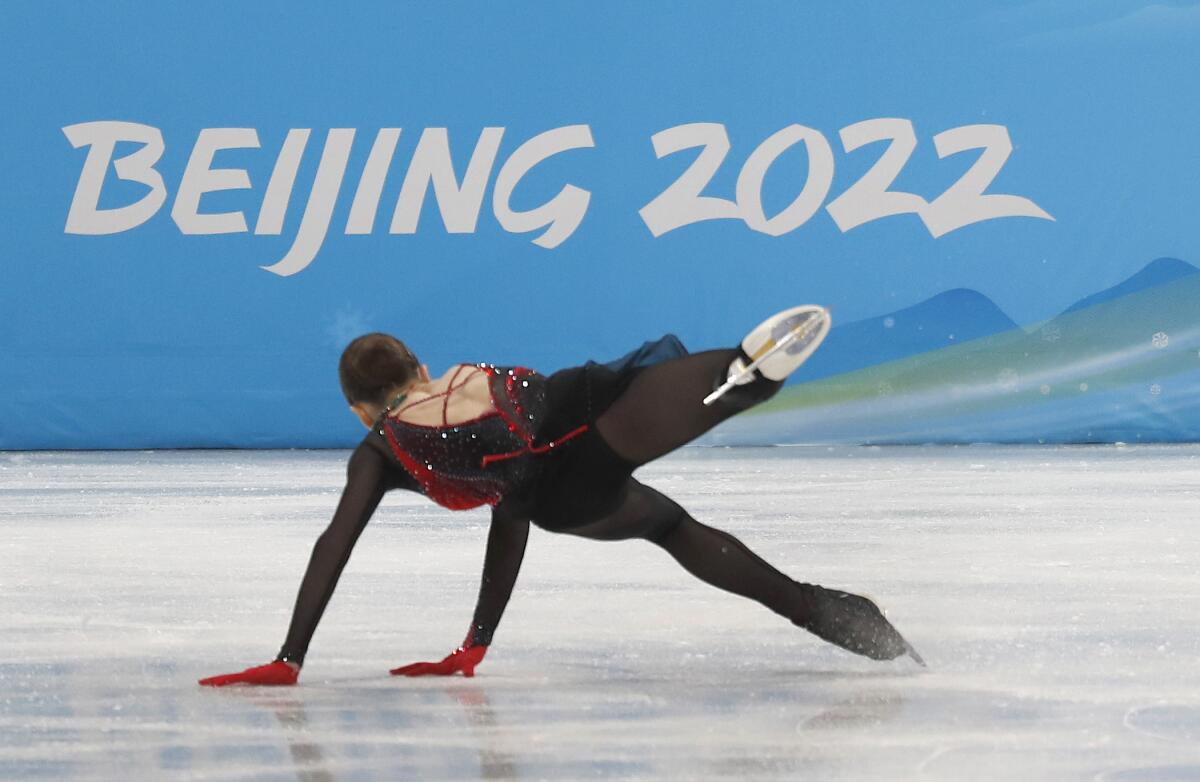
- Share via
BEIJING — Maybe the pressure was too much for a teenager — even a precociously talented teen such as Kamila Valieva.
The 15-year-old Russian hailed as the new face of women’s figure skating stumbled through triple jumps and tumbled out of quadruples, waving a hand in disgust as her free skate program ended.
After a week embroiled in doping allegations and controversy of international proportions, Valieva quite suddenly looked her age Thursday night, bending under a weight that pressed her out of medal contention, from first all the way down to fourth place.
That opened the door for a slightly older and certainly steadier teammate, Anna Shcherbakova, to nail those quad jumps and win gold at the Beijing Olympics.
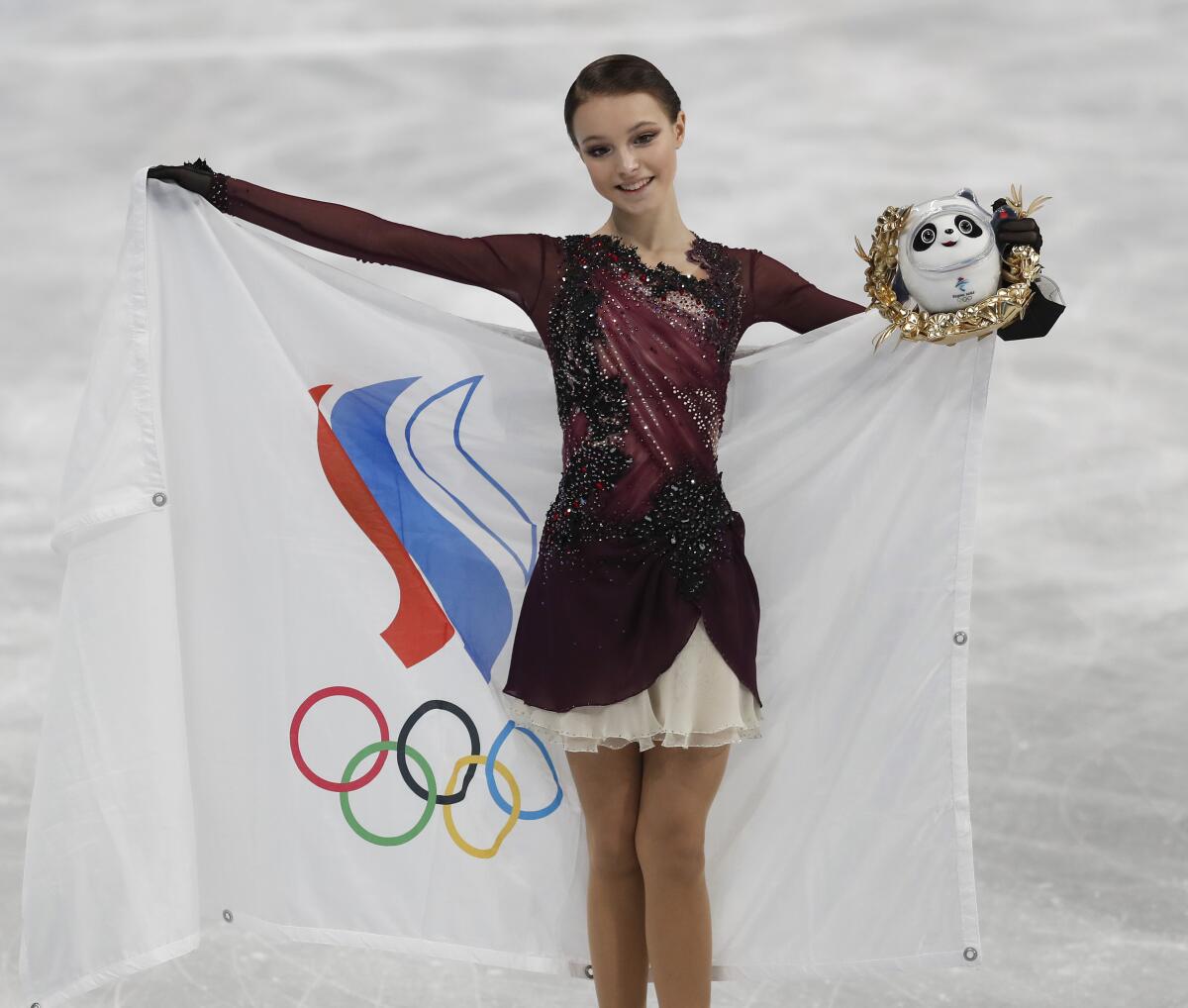
“It means so much,” the 17-year-old Shcherbakova said. “Being able to perform my program cleanly is everything I wanted.”
Another teammate, Alexandra Trusova, took silver by landing no fewer than five quads and Sakamoto Kaori of Japan got bronze for a subtle, clean program.
“I don’t have the big jumps that others have,” Sakamoto said. “That means I have to make all my movements delicate.”
Skating was only part of the narrative at Capital Indoor Stadium because of the furor that had swirled around Valieva. The International Olympic Committee probably dodged further controversy when she failed to medal.
The Valieva doping scandal at the Winter Olympics raises questions about the competence of the International Olympic Committee and the World Anti-Doping Agency.
The trouble started not long after she became the first woman to land a quad in Olympic competition, helping the Russians to gold in team competition last week.
News broke that she had tested positive for trimetazidine, a heart medication that helps the body use oxygen and increase blood flow, in December. The result had somehow languished in a Swedish laboratory.
Russian anti-doping officials provisionally suspended their young star, pending further investigation, then reversed themselves on appeal.
Olympic officials joined with the international skating federation and World Anti-Doping Agency in a last-minute effort to disqualify Valieva but lost in the Court of Arbitration for Sport, which sought to preserve due process and ruled that as a minor — or “protected person” — she should be judged differently from an adult athlete.
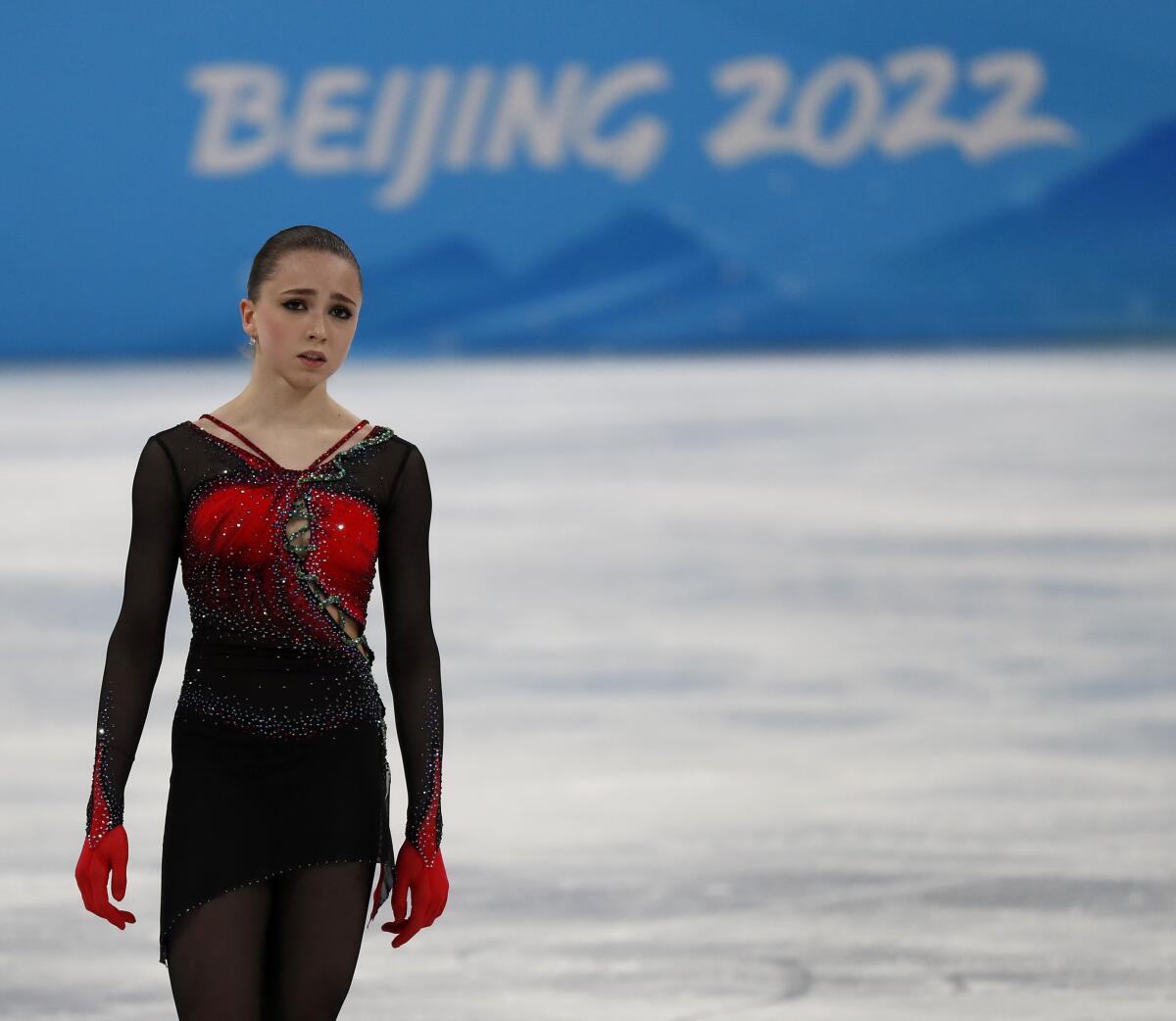
Court of Arbitration for Sport arbitrators made it clear they had not ruled on the merits of the case, only the “narrow issue” of suspension. While their decision might have been legally valid, it did little to mitigate anger in the louder, much larger court of public opinion.
The timing could not have been worse for Beijing, which was running a fairly smooth Games despite pandemic-related challenges and anemic television ratings in the U.S.
The grassroots Global Athlete organization described the Valieva situation as “another example of the failures of the global sport and anti-doping system,” referring to recent scandals in which Russia was found to have orchestrated state-run doping programs involving more than 1,000 athletes.
Those scandals had forced select Russian athletes to perform as so-called “neutrals,” representing the ROC, or Russian Olympic Committee.
Amid continuing calls for an outright ban, U.S. Olympic & Paralympic Committee officials expressed their displeasure, too. American skaters had won silver in team competition but had not received medals, the IOC deciding not to award anything until the Valieva matter was resolved.
Figure skater Kamila Valieva of Russia earned the highest scores for her short program, but a positive drug test tarnishes the accomplishment.
“This is just really frustrating and difficult,” USOPC Chief Executive Sarah Hirshland said Thursday. “It’s unfair to these athletes.”
The young woman at the center of the tempest, Valieva managed to grab hold of first place during Tuesday’s short program, but the pressure got to her when Thursday came around and the top handful of skaters took the ice.
Trusova struck first with that audacious program, which included a few stumbles but rivaled the men for sheer air-time.
“My coach said maybe I should jump only four quadruples,” she recalled. “I said no, I will do five.”
Sakamoto was content with her simpler program but did not expect it to earn her a medal. Sitting in the green room with the other leaders, she kept waiting to get knocked off the podium.
The penultimate slot belonged to Shcherbakova, the reigning world champion who might have been overlooked amid all the hype, then consternation, surrounding Valieva. She began with a quad flip-triple toe loop combination followed by a quad flip. If the remainder of her program lacked serious fireworks, it was clean and expressive.
“I realized I had done the maximum of what I was capable of,” she said. “I had done everything.”
The only thing left was to watch Valieva, who appeared tense in warmups, stopping for a brief, animated discussion with her coach. She quickly missed her first quad, then a triple. A second quad landed her on the ice.
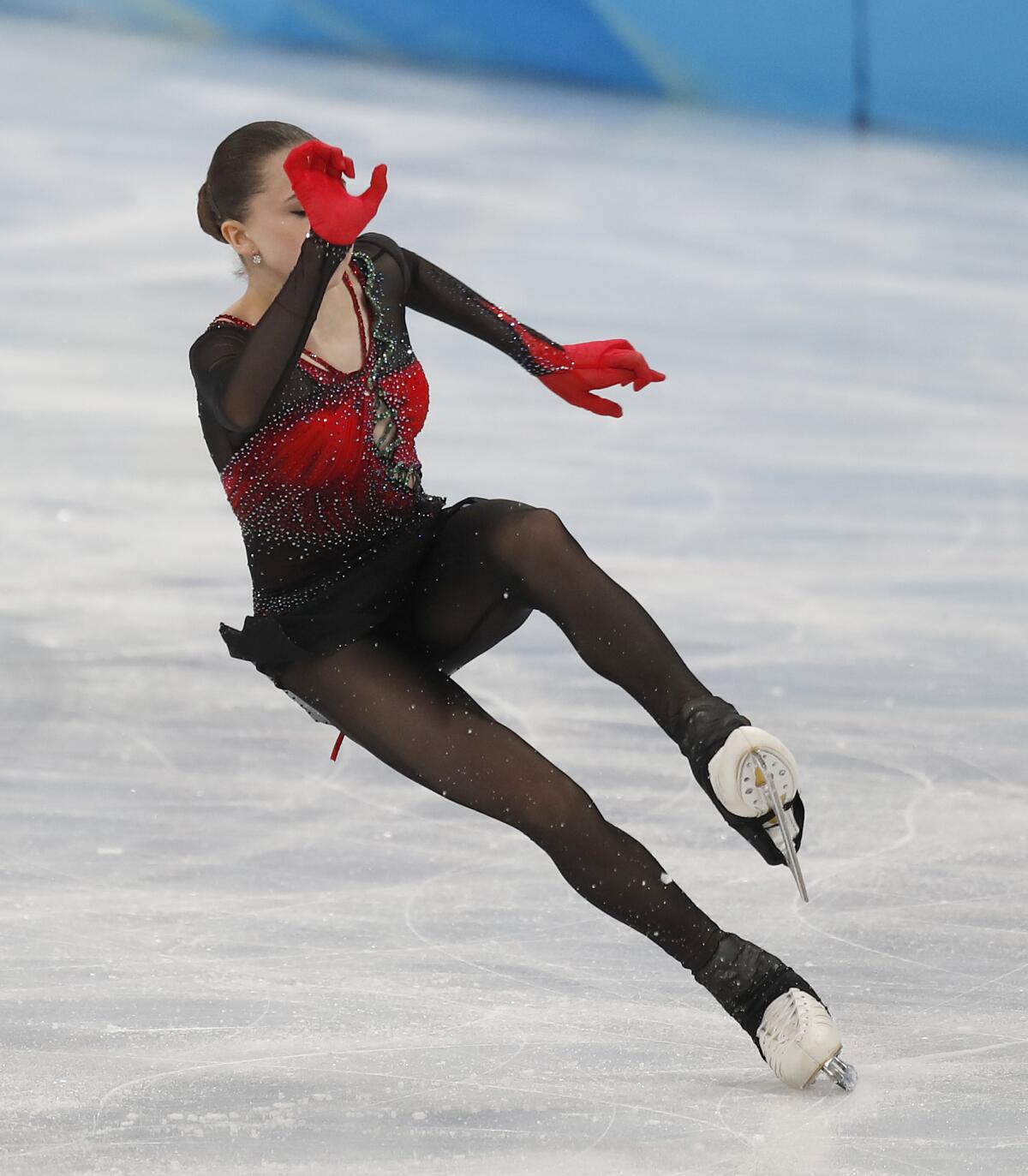
Things did not get any better from there.
“I saw from her first jump how difficult it was, what a burden it was for her,” Shcherbakova said. “I understand what an athlete feels.”
Neither of the Russian medalists would say anything more about their teammate, Trusova telling a reporter, “if you want to ask about Kamila, direct questions to her, not me.”
With Valieva off the podium, officials quickly arranged a medals ceremony for Saturday afternoon. They no longer had to worry about leaving Beijing with an asterisk next to the winner’s name, pending investigation.
As she has done all week, the Russian teenager walked quickly through the mixed zone, head slightly down. Whatever thoughts lay behind her tense expression, she was keeping them to herself.
More to Read
Go beyond the scoreboard
Get the latest on L.A.'s teams in the daily Sports Report newsletter.
You may occasionally receive promotional content from the Los Angeles Times.

